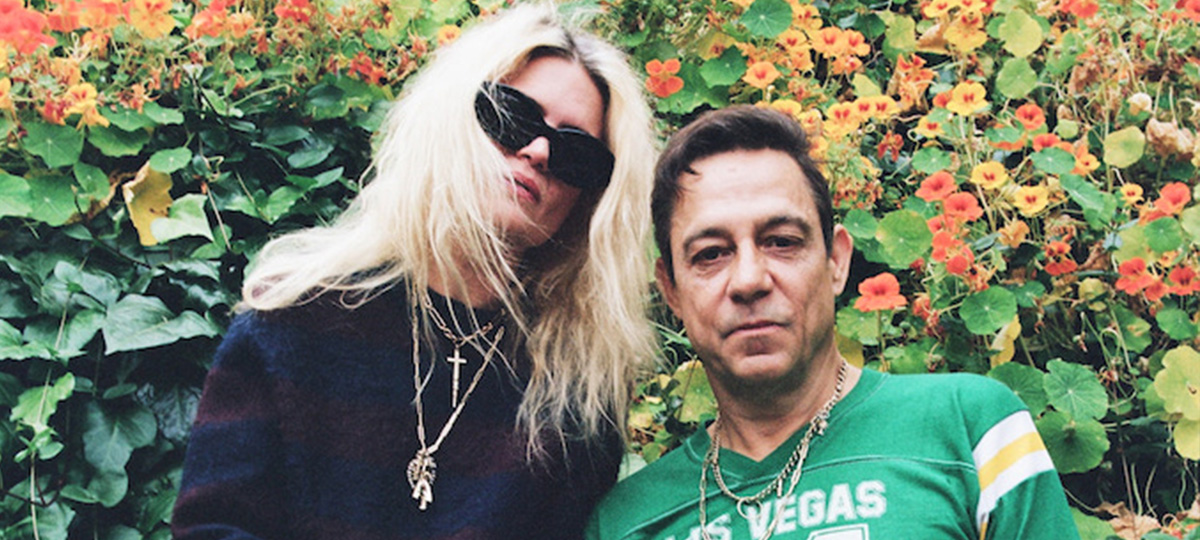
"Records are so beautiful, they're so amazing, and to have as many as we have at this point... they spark all those memories of the places that we've been and the times we wrote the songs and where we lived and where we played those things, the different stages of our life that we were in, and that's really cool," reminisces The Kills' Alison Mosshart on soundtracking the past two decades with musical partner-in-crime, Jamie Hince.
Ahead of the duo's sixth album, 'God Games' - out on October 27th - Coup De Main met up with Mosshart and Hince in Los Angeles recently to discuss their artistic process, being affected by weather, and finding a God...
COUP DE MAIN: At the beginning of 2020 you had been already working on a new album... and then the pandemic hit. How did the album continue to take shape over the past 3 years?
THE KILLS - ALISON MOSSHART: We kept writing, but during the pandemic it slowed down.
THE KILLS - JAMIE HINCE: It was kind of perfect timing and terrible timing because we finished touring right at the end of 2019. We're not, by our own admission, not very good at writing when we're touring. We toured our last record for nearly three years, so we had a few scraps of ideas, but we really started writing properly in 2020 and then the 'P-Diddy' happened. <laughs> I've decided that I hate saying it, and I hate talking about it, and I hate saying "during lockdown."
CDM: Or "unprecedented times."
JAMIE: Yeah, fucking 2020. But we started writing/waiting for the world to go to normal, and then people couldn't play live for three years and that's our bread and butter. It sort of at some stage became this beautiful open road - where you can really start the band again and you can really experiment. I tried to learn to play piano, and in that time I kind of learnt how to use my studio properly. I started little side projects because I wanted to approach things completely differently and with a clean slate. It became actually fantastic for a reasonable amount of time, but the road of freedom was so open that it became the road of creativity and it was just euphoric to the point of madness I found. We haven't counted what we wrote, but it's probably 100 things or more.
ALISON: But I had a real sense really early on in the 'P Diddy' that I didn't want to write [about it]. I didn't want to sing about it. And I didn't want to have songs that made me think of that time, that I had to perform for the rest of my life. I really felt like he would went off and learned how to do all these other things, and my artistic creativity went in a totally different way, like making videos and painting, because I just wanted to feel good when I was writing. The record is really, for me, the stuff that I've contributed from before the pandemic and right afterwards. This burst of when we could finally go into a studio and things were looking better and then you just can't stop writing.
JAMIE: There's something about that as a musician or creative or artist or whatever you want to call it, it's something that you long for. It's such a fantastic thing that your job every day is just to create and you've got all this time to do it. We met up last night and we were going through songs that we didn't use for the record to see what else we could record for B-sides and things. It was magical.
ALISON: It was so fun.
JAMIE: It's things that I had forgotten about!
ALISON: I was like, "Who was I when I wrote that?" I didn't even recognise myself!
JAMIE: Using all these old sort of 50s string things, and I can't even remember doing it.
CDM: It's like you're revisiting a past life.
JAMIE: Yeah!
ALISON: It's exciting though.
JAMIE: But it was maddening as well - it became really maddening feeling like you're in the wilderness. It's one thing feeling like you're free, but it's only a stone's throw from being completely lost in the wilderness of freedom. I went through some absolute madness.
CDM: Your last album 'Ash & Ice' started with 'Doing It To Death' - in which you were candid about feeling jaded by the relentless pursuit of pleasure and the fallout from it. With a 2023 mindset, how do you feel now looking back on that song?
JAMIE: I don't look back that much really. I certainly don't think of it as being part of what we're doing now and I don't dwell on it too much.
ALISON: I think all songs can be reapplied in the future and to whatever day that you're in. If something was inspired by one thing, it always changes and becomes something else. Whoever's listening to it, whatever their life experience is, or whatever they're trying to sort out, that is what a song is - it's a vehicle to do that within. So I don't ever think about our songs and about why we wrote them.
JAMIE: I'm glad I'm not in that frame of mind now, but I'm also proud that was a snapshot of what we were doing. It just came out of touring too much, so in a way this was kind of the absolute antidote.
CDM: In comparison, this new album opens with 'New York' and it's more of a celebratory song than 'Doing It To Death' - does this reflect how you're feeling currently?
ALISON: I don't know how to describe how I'm feeling currently, but I love that song. To me, it's an "I love New York" song and I love New York, so it makes me excited when I hear it. It made me excited to write it and record it. It's not a dark song.
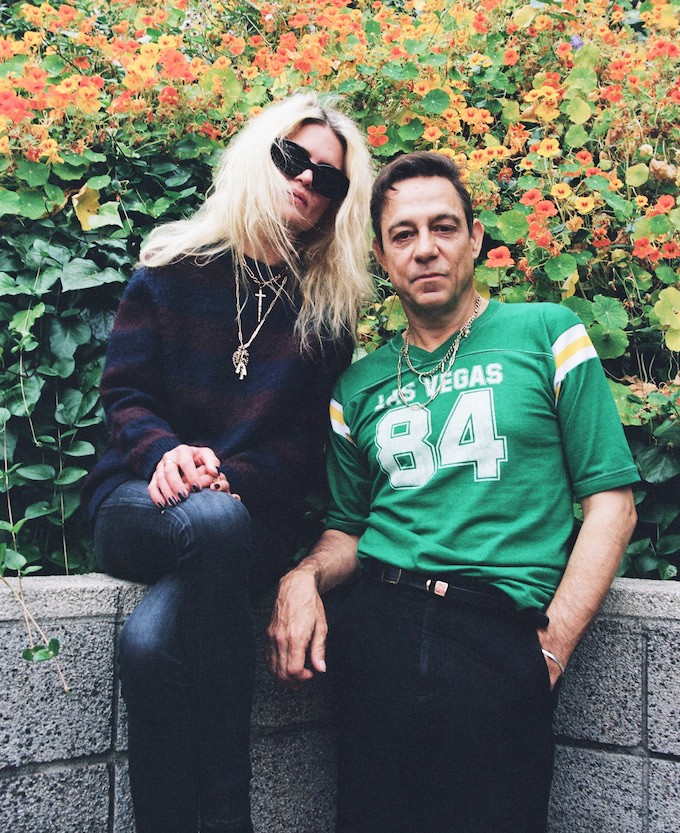
CDM: 'New York' is your second NYC-referring song (with 'What New York Used To Be' as the other) - what is it about New York and the idea of New York that is so significant to you?
ALISON: We spent a lot of time there really early on when we started this band. We recorded our second record there, and lived there for a while doing that, and writing that. There were a few false starts with recording that record; a couple studios. We'd come to America and do whatever - we would always live at the Chelsea Hotel, so there is just such a connection.
JAMIE: It's a perfect climate to be creative and creatively excited in because it's packed full of people. So there's always something to do with the human condition and interaction. It's chaos, but it's also ordered in some weird way. It just makes you think a lot of things, and it's dangerous, and it's really creative. It can completely swallow you and it can completely free you up as well.
ALISON: I think it's the most inspiring city for me. I'm like: 'I'm gonna play a show, I'm gonna write a book, I'm gonna write a song.'
JAMIE: It has all the things that you want to write about the human condition in this tiny little spot of land surrounded by water. The history also, I find it very inspiring.
CDM: It's New York.
ALISON: It's New York, that is all you've gotta say!
CDM: "Caught up in all of the drama and all of the fuss," begins 'LA Hex' - is that how you both feel about Los Angeles?
JAMIE: Well, actually, this was part of my madness. I realised that there's aspects of God in my creative life, but not in my day-to-day life. I'm an atheist in my day-to-day life and I thought it was interesting that when it comes to art I have to find something otherworldly and some sort of superpower super-being - I thought it was interesting that I can really naturally write about God in music, but really kind of poo-poo it in reality. <laughs> I kind of went on this mission, or almost like a New Year's resolution, that I was going to find God, or a God - I was going to find something and it came out of being brutally lonely and facing yourself every day in the 'P-Diddy'. I think all these things are to do with love, lack of love, death, getting older - these are all things where you find something that is not just day-to-day stuff, but yearning to find something else. That's kind of what that "caught up in all of the drama and all of the fuss" means. The helicopters were buzzing around over this, and it made me think: "What's up there and what's out there? Where is this magic coming from?" Magic isn't always positive - sometimes it's just a chaos, and I just started writing a scene. I wanted to make that song and arrange it like it was sort of film thing.
CDM: I love the lyric, "I was daydreaming at 100." What's the last thing you daydreamed about or had a vivid dream about?
JAMIE: Well, I was on a really insane... I went down a rabbit hole looking up Björk from when she was a kid, and all her early bands like Kukl and watching interviews, and I got obsessed with it for hours and hours and hours. So I was dreaming a lot about Björk.
ALISON: You woke up and you called me. <laughs>
JAMIE: I called her straight away, I was like: "Oh my god, I had the most mad dream, it was amazing!" Most of it was just me being present in a lot of the videos and she was telling me all sorts of stuff, and I was like a bratty little kid listening and obsessed. In terms of daydreaming, that's my fucking M.O.. Unfortunately I overthink everything and daydream about everything. That's really, I think for both of us, where ideas come from.
CDM: Did you name the new album first? Or write the song 'God Games' first?
JAMIE: Wrote the song first!
CDM: Why did you decide to name the album after it?
ALISON: Such a great title.
JAMIE: It was just a good title.
ALISON: It kind of scares me, and that's why I like it so much because it can be so multi-dimensional and can mean so many things.
JAMIE: It sort of summarised where I was at with this kind of coming to terms with finding "a God" because it has video game connotations and it just seemed to wrap the present world up quite nicely. The same people that talk about AI and technology, they also go up to accept an award and the first thing they do is thank God for it. The two don't really correlate, it's a bizarre thing this over-absorption of technology, and then this nonsensical belief in something that's absolutely intangible. 'God Games' seemed to wrap it up nicely.
ALISON: Yeah, it seems like risky business. It seems doing something dangerous like gambling or playing a game like love - taking a chance on something that's probably going to destroy you and any kind of thing like that. It is great for almost anything that's worth doing that can wreck you.
JAMIE: It's actually a term for a certain kind of video game like Fortnite and The Sims, where you play a character and build a world, and I liked that. I liked how deep it was and how shallow it was as well.
CDM: Can't wait for The Kills x Fortnite collab!
JAMIE: Oh my god, yeah!
CDM: '103' is so good! I think it's my favourite on the album. What was running through your mind while writing '103'?
ALISON: That is a real LA song. You'd have to put the lyric sheet in front of me, but again, it's all feelings. It's all a mood I was in that night - that song was written in four minutes. It's one of those really magical, lovely things, where these were all the things I was thinking about: 'This is what I feel, and I'm worried about this person so that person's in there, and it's the summer and it's fucking hot, and I can't stand it.' It's kind of destructive and bizarre. There's a lot of LA on this record and a lot of these extreme feelings about it and extreme versions of it. Nothing like how beautiful today is in this overcast flower garden we're sitting in - it's a little different than that song. Sometimes I think of that song as like a description if someone's driving you to the airport, some of those neighbourhoods you drive through and some of those things you see - it's very cinematic, and very bleached out, and hot and strange.
JAMIE: I like that area... there's a piece about how time moves too slow for that kind of blame. It's like blaming things like the sun and time.
ALISON: Totally pissed at those things all the time!
JAMIE: It's kind of a way of taking a deep breath and just getting on with it, but to blame them on these magnificent, ridiculous, like huge universal things. I like exploring that area.
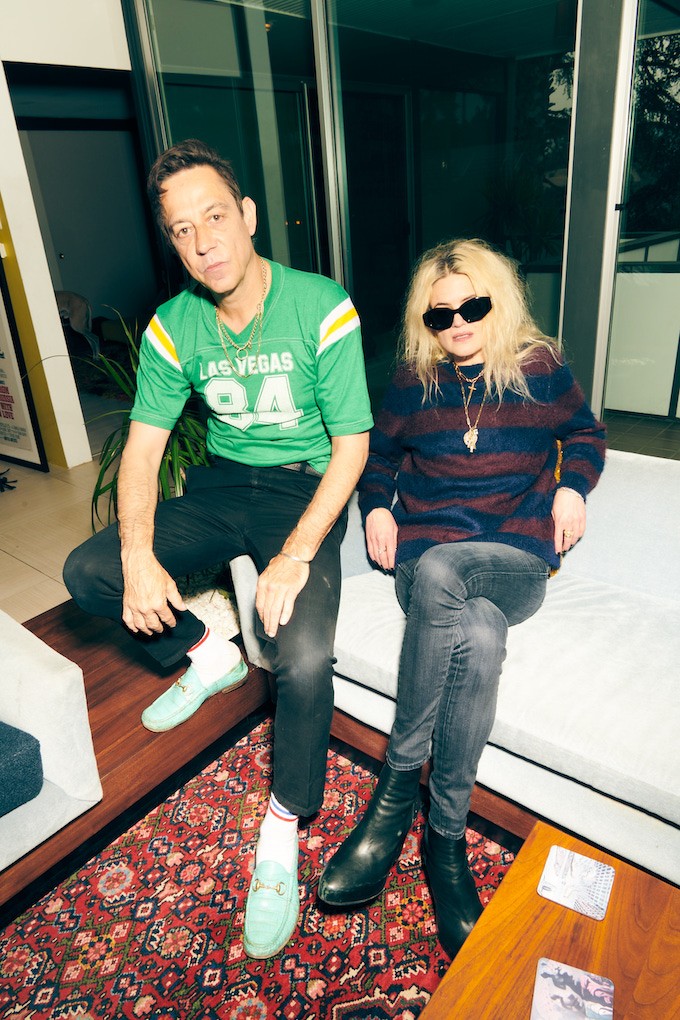
CDM: There's a lot of weather imagery on this new album, with lightning and thunder in 'Going To Heaven', a storm in 'New York', and the sun in '103'. What is it about weather that resonates so much with you?
JAMIE: I never thought of it like this!
ALISON: It's the God shit! I'm personally very affected by the weather, as Jamie will have you know that I complain about it constantly - being hot, and how I hate the sun. This isn't new, this is just me. I think I write about those things because they're perfect adjectives to describe emotions. They're things that people understand and they can be applied in lots of different ways to be frightening, to be comforting, or to be overwhelming. I live in Nashville and that is the stormiest, craziest place, where it'd be just a beautiful day and then all of a sudden your house might collapse under 1000 lightning bolts and you have no power for five days. And then everything's great again. It's very unusual and also wonderful. I love it.
CDM: Weather always feels so much bigger than you.
ALISON: Way, way bigger.
CDM: Do you organise your memories according to weather? Like do you remember what the weather was like in your core/important memories?
ALISON: I think I do.
JAMIE: I remember things by which clothes I was wearing.
ALISON: You do, very well.
CDM: Billie Eilish once told me that she remembers things by how they smelt.
ALISON: I'm like that. My sniffer's pretty extreme. I remember smells, like I'll walk through anything and I'll remember being four in a preschool. It's so intense to me.
JAMIE: Do you remember with Bill [Skibbe] when we were working on a record and we went to dinner, and he'd been vegan for a long time and he stopped being vegan and he had lamb for the first time since he was a kid, and he just could not stop crying? It just reminded him of his grandma.
ALISON: It just overwhelmed him.
JAMIE: He was laughing at how stupid he was being.
ALISON: It's like he got kidnapped by memory.
JAMIE: I'm feeling like these are all the things that we found on the search for "a God". It's basically the weather, time, smell, taste.
CDM: When you think about all of the music that you two have written together over the last few decades, do they collectively feel like a stack of polaroids you can rifle through anytime? Or more like a jigsaw puzzle you're still figuring out and fitting pieces into all the time?
ALISON: It feels like the film of our life. It's a document of our entire life, like the last 20 something years. Our growing up has spanned its life as moments in time. What I said about songs being able to be reapplied in any way, it's the same way as I make a record and then people listen to the record, and they feel totally different about a song and it speaks to them in that way. Our songs speak to me in different ways all the time, so it's just constantly catching up with you.
JAMIE: We had that last night as well, we must have listened to 25 songs that got forgotten about. Alison would go, "Oh, my God, what was I thinking?" And some of them it was like, "No I don't want to revisit where I was there." I love that.
ALISON: I might not have known what I was thinking, but that makes sense to me and that sounds important to me, and that should be said. Records are so beautiful, they're so amazing, and to have as many as we have at this point... They spark all those memories of the places that we've been and the times we wrote the songs and where we lived and where we played those things, the different stages of our life that we were in, and that's really cool.
CDM: I also love 'My Girls My Girls'. I think the line, "I picked a bad time to feel this good," is a big 2023 vibe. It feels like a weird time to feel happy when there's so much terrible stuff happening in the world. What was the process like creating that song?
JAMIE: There's a couple of songs on [the record] that I've written, then me and Alison sing them together... I just really quietly like this idea that I'm not brave enough to say some of the things I want to say, and I have my little sidekick in there to speak for me. I really liked the fact that it's a duet with a guy singing, "My girls, my girls, I am the worst," it's the polar opposite of a female voice singing, "My girls, my girls, I'm the worst." I just like these kind of parallel, colliding ideas about being a let-down - not just being a let-down, but being a ruthless let-down. <laughs> But it's done in a very romantic lost way.
ALISON: Yeah, it's quite beautiful. It's interesting. I really love that song.
JAMIE: Just that thing of being like, "I'm so sorry. I'm the worst," but right now I'm having a really good time, I'm just gonna go out and have a blast and be a dick.
ALISON: Oh, god! <laughs>
JAMIE: I haven't described it very well.
CDM: To me, this new album has a very restless pent-up energy vibe, so when you imagine yourself in complete contentment and peace, what does that look like?
ALISON: I have no idea. I think if there's a restlessness, it's probably because there's that undertone of everything that we've gone through, but that's exciting and that makes it kind of punk. I'm into that.
CDM: It's your first album since 2016, which is very exciting!
ALISON: Yeah! It should come at you with a fury. Contentment is not something... I don't think I'm ever sort of... I think you're always trying to find this thing, but finding it would mean the end of the search and I really love the search. Making art, it's not really contentment that you're looking for. The things that make me happier is having a great idea and figuring out how to execute it. What makes me happy is performing that idea in front of people and seeing how even after it's been recorded, and out there in the world, how it can still change, and how it can still get better every time you play it, you know? It's always this process. The process is the excitement thing. I've never thought about what it's going to take to feel content.
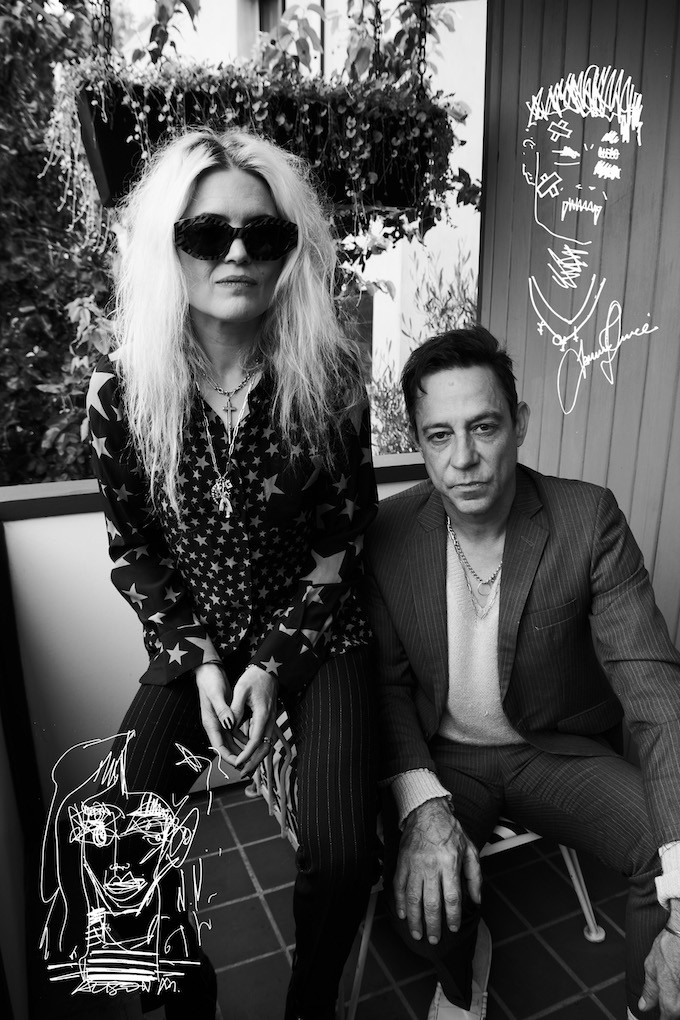
CDM: You end the album with the lyrics, "Baby, you'll find better days." Is that your life mantra currently?
ALISON: I thought it was really nice sentiment to put at the end of the record to send everyone off on their way.
JAMIE: That was one of the first times we've really done that, to pick the sentiment for the end of the song. There's a line about big black open skies calling out for it. I just liked ending the record like that, and a synth going on, like we're going out into space.
CDM: Do you have favourite lyrics on this album?
JAMIE: There's only really a handful of songs that I'm proud of from start to finish, and I was determined writing this record--
CDM: What are the songs that you're proud of from start to finish?
JAMIE: Well, 'Baby Says'... just lyrically. I'm really hard on myself with things, but 'Baby Says'... maybe one!
ALISON: I really love 'Love and Tenderness'. There's no lyrics that I've put on this record and recorded that I don't love. I think [Jamie] feels the same way.
JAMIE: That's what I mean! I was determined to really find a language to sort of write with that I was really comfortable with and it didn't jolt me. I really worked hard at finding a language to write lyrics to a guitar record with.
ALISON: Always for me, it comes out when we're playing, where I see what people are responding to and what kind of energy comes back. The ways that you can play words in songs, and what you can do with them and how they actually stand up, and how much power they have in front of an audience. We'll be on tour and be like, "It's our favourite song to play!" during this run or something, and then it'll change and it'll be something else. It's like we've found the thing of how to present it in a way that is very moving.
JAMIE: I wouldn't say it's my favourite, but I like things like... "How we came, how we did go into heaven."
ALISON: I love those words and I love playing.
JAMIE: It was a real sort of half-and-half lyric song that we sat down and worked out how to go into the next scene of the song. It seems like a real honest day, that song of going through emotions and arguments.
ALISON: It's a real story that one - it's real fun.
CDM: Producer Paul Epworth was the sound-man for your very first tour back in 2002-2003... what was it like reuniting with him on this album?
ALISON: Oh, we all look older! <laughs> No, it was great. It was really nice to work with him again. It was a funny idea. I was in London and I was just like, "I'm just gonna go check out his studio and see how he's doing," and then just asked if he would be interested and it kind of felt like one of those cool life circles that it would be an experiment to see our initial sound-man producing.
JAMIE: We had a little Zoom call with him and he was on the beach in Mexico in a straw hat, and we were in LA and it just felt like we should tie up this circle, and it's been quite a mad journey. We didn't want someone that was just jumping on The Kills now. We wanted someone that knew where it had come from, and Paul more than anyone. He was doing shows that no one's seen, so he knows where this seed started.
CDM: He's seen you at your worst, now he gets you at your best.
ALISON: No, we were great - there was just no one there! <laughs>
CDM: You guys worked with Beck on an early version of 'Bullet Sound', right?
ALISON: Yeah, we did. We never finished it. We only worked with him for a couple days.
JAMIE: I had been living in LA for a few years, and Beck lives a stone's throw from me, like a minute and a half from me and I'd never seen him. Then suddenly there were five or six months where I saw him almost every day and it just felt like, "Hey mate, I think we needed something to kick-start the recording process," but it was never going to be a permanent thing because he was on tour. It was the first foray into getting the songs out of our bedrooms and into someone else's mind. Getting over the fear of hearing proper feedback from someone that has become a really good friend and someone that is really, really versatile with music. And we knew he'd be quick, so we actually did four songs with him.
ALISON: Yeah, we started four!
JAMIE: I saw him not so long ago, and he wants to finish versions of them, so we should do that.
ALISON: We should!
CDM: What do you think the ratio is of unreleased The Kills songs to actually released songs?
JAMIE: 20% released? Not even.
ALISON: Yeah, not even. We write up a storm, but it's a little intense.
CDM: Jamie, you've said that when you were a teenager you'd sometimes buy an album just because you liked the photograph on the cover. Is the creation of The Kills album covers something you're very involved in?
JAMIE: Yeah! I just used to spend a lot of time in record shops and not know what the music sounded like and just got really excited about the name of a band or the photo.
CDM: It's fitting how the 'God Games' album cover nods to the matador lyrics on the album.
JAMIE: A couple of people have suggested we might get some grief from showing a picture of a bullfight but I think that's--
ALISON: They're doing a beautiful dance - they're just hanging out.
JAMIE: I just think that it's a really lovely little metaphor for life and humans. Just that absolute cruelty wrapped up in tradition and wrapped up in garments and presenting it in this really beautiful way. Something that is essentially savage and primitive and brutal, and that is something that inspires me to make music and to write about. It's always in there somewhere.
CDM: Alison, you've said that when you were in your first band Discount, that your tours were booked via fanzines. Everything is so digital now, for better or worse. What do you miss most about that era of music when everything was still very real-life and tangible/physical?
ALISON: I miss the communication between people because I think all the digital stuff has made us all not that close. Jamie and I's very first Kills tour, I booked entirely by post in writing letters to people from England and waiting for a response, whether we could play in their little club or not. Because of that, we have relationships with a lot of those people still. That kind of way of doing things bonds people, whereas you can fire off 50 emails a day and people can't handle it. It's super impersonal and there's nothing special about it.
JAMIE: It's made liars of everybody.
ALISON: Everyone thinks everything is easier, but I think actually you're wading through so much shit now. It's just endless amounts of shit and I'm so glad that I grew up in an era where I didn't have all these modern conveniences and I had to learn how to use a map and use pay-phones and have patience. If someone doesn't call you back right away, it's not some deeper fucking meaning.
CDM: People are busy.
JAMIE: People lie about being busy!
ALISON: I don't think we're really meant to be able to handle all this, but we're doing our best. I miss the trust. There was such a trust with that kind of stuff and such a community. In that kind of scene at that time, there was such a community and everybody helped each other and everybody stayed on each other's floors, and everybody threw gigs for each other. That was really cool and I bet it still exists - I'm just not in a band that size anymore playing in a living room, but I hope it still exists
CDM: Alison, have you been painting much recently?
ALISON: I have been a little bit for certain things, but I really would like to do some proper painting shows this year in amidst of all the music stuff we've got going on. It's just time, because the last one I did was 2019. I've been doing these little kind of pop-up things that I do on my own, but not in a gallery, so I'd like to do some gallery shows this year.
CDM: Jamie, have you written any new fiction stories?
JAMIE: There's certain things that I spend quite a lot of time doing that I don't... not everything needs to be for public consumption. I think there's a kind of madness about egos. I like doing that, and I spend a lot of time doing photography and I don't mind that going to the public. I got represented by a gallery here and I like that. It's the polar opposite to being a musician. Your art you take it in, like 120/5 of a second and that's it - you don't dwell on it.
CDM: I read that you once wanted to be a playwright - could you ever see yourself writing a play?
JAMIE: I wrote two one-man plays when I was in my early 20s and I did them at Edinburgh Fringe Festival. I just took a break from it because I did some music as well. I had a band playing some music that I'd written as well and it happened that I got a record deal from the music that I'd written, so I went and did that thinking I'd always go back to playwriting, and now I don't think I'm brave enough. I definitely like the medium, but I've been out of that for so long that I think if I wrote a play now, it'd be really old fashioned. I really like sort of physical theatre and Steven Berkoff, Howard Barker and that kind of thing.
CDM: Do you prefer playing live as a two-piece? Or with an expanded line-up?
JAMIE: I think it all had its place didn't it? I liked playing with four drummers, when we had the four marching drummers. I like those shows we did with the gospel choir. I really loved playing the shows with Johnny and Scott. Although sometimes when I see it back, just aesthetically, it looks more like a regular band to me playing like that, especially when I compare it to some of those old shows we did at La Cigale where it's just basically a light-bulb, and two amps, and you me. That stuff is hard and it's exhausting and I think people demand more even if they comment on how amazing that was. I think they demand more now, it's just naturally demanding if you go and do a big festival, if you don't have an LED screen, if you just have a little light-bulb and a carpet...
ALISON: <laughs> I would love a light-bulb and a carpet.
CDM: And most importantly, when are you going to return to New Zealand?
JAMIE: Well, there's nothing planned. We're just starting to schedule our tour now. I have to say, and I am not just saying this, I yearn to go back to New Zealand.
ALISON: I know! We've only been like once or twice.
JAMIE: I absolutely love that place! Taking it back to Björk, it's a bit of a Pacific Iceland, isn't it? It's such a tiny population and some of the most brilliant things come out of it. Some of the most crazy, superstar, brilliant things come out of it. Maybe it's changed since I went there last time, but such fantastic nature and the nature of people.
CDM: I promise you, it's still the same - New Zealand never changes.
JAMIE: All the fucking vintage shopping is amazing! It's the one place where it really is culture shock when you go thrift store shopping because the clothes are like... wow! Here it's all just Nike hoodies. I got some unreal things there. I came back with trunks full of stuff!
ALISON: Hopefully, 2024! We'll see. We'll see how busy they keep us, and with festival season and all that, and what we get to do, but we must come on this album.
The Kills' new album 'God Games' is out October 27th.
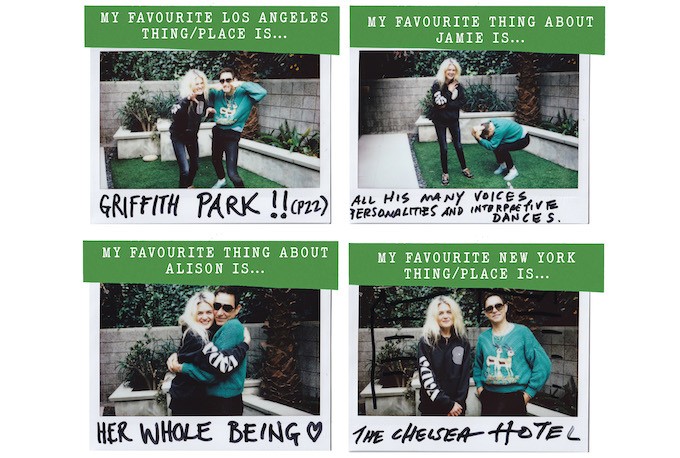
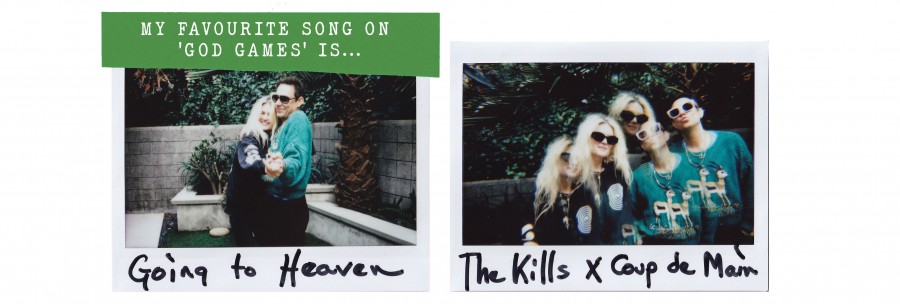
Watch the video for '103' below...

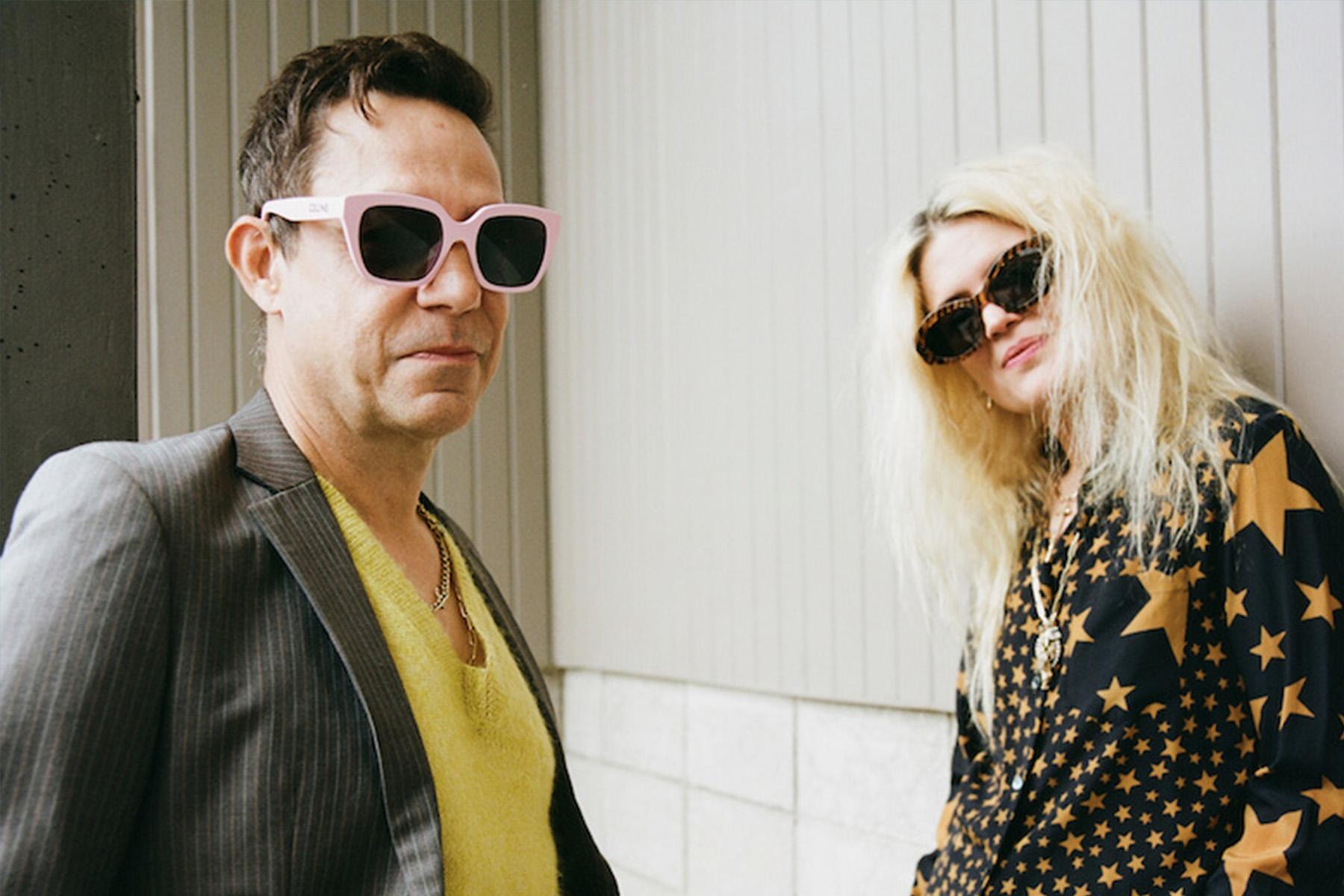
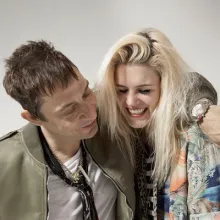 The Kills
The Kills